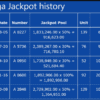Through the first six months of 2022, the amount wagered on US thoroughbred races dipped ever so slightly compared to the same timeframe last year. However, data collected by Equibase also showed a sharp rise in purses for races.
Classic Causeway, with Julien Leparoux aboard, wins the Caesars Belmont Derby Invitational Saturday at Belmont Park. According to data from Equibase, betting on US thoroughbred races was down slightly through the first six months of the year. Purses, though, rose more than 14%. (Image: NYRA Photo)
Equibase, which oversees an industry-owned database of racing information and statistics, reported a handle – the amount wagered by all bettors – of $6.27 billion for the first half of the year. That amount was just $12.2 million less than what was wagered during that period in 2021.
However, the slight decline came even though there were more race dates (1,929 in year-to-date 2022 vs. 1,881) and more races (15,870 vs. 15,792). With more live racing days and races, the average field size shrunk by nearly 2.5% to 7.25 horses per race.
Typically, larger fields draw higher handles since they give bettors more wagering options. That also can help lengthen the parimutuel odds for the better horses in the race and generate higher returns for winning bettors.
Smaller fields were definitely prevalent in some of the sport’s highest-profile events. The Santa Anita Derby, a key Kentucky Derby prep race, featured just six horses this year. Last month’s Belmont Stakes undercard, which featured some major stakes races, saw a four-horse field in one and five-horse fields in three others.
The all-sources handle for the Belmont Stakes card fell by nearly $14 million from last year.
Horsemen Competing for More Money
While betting pools roughly stayed the same, the amount of money horsemen competed for jumped up by nearly $73.5 million over the first half of the year, according to Equibase.
Purses for the 15,870 races totaled $588.6 million through June 30, a 14.3% increase.
Much of that increase is fueled by subsidies provided by other gaming ventures. Revenues from historical horse racing machines (HHR) have allowed Kentucky tracks to bump up their purses for races significantly in recent years. Other states use revenues from slot machines or video lottery terminals to bolster purses.
However, the use of gaming subsidies in some states is starting to attract questions from some lawmakers and advocates, who wonder if earmarking millions of dollars for racing interests is an appropriate way to spend the money.
Pennsylvania Gov. Tom Wolf has proposed several times to take hundreds of millions of dollars from the state’s racing development fund and divert it to a program that makes college education more affordable.
A similar effort has started in New York, where lawmakers have proposed ending more than $230 million in annual slot-generated subsidies to the state’s thoroughbred and harness tracks.
Harness Racing Sees Big Decline
Harness racing saw purses rise as well, but a report Friday from the US Trotting Association found a steep drop in handle for the second quarter of 2022.
Compared to last year’s second quarter, wagering dropped by more than $70 million to just $415.4 million. That was down 14.7% from the same time in 2021. The decrease came despite the 2022 second quarter saw one fewer race day (851 this year) than last year’s quarter.
Purses rose more than $17 million from last year to $116.5 million.
The post Horse Racing Handle Down Marginally for First Half of ’22 as Purses Grow appeared first on Casino.org.









